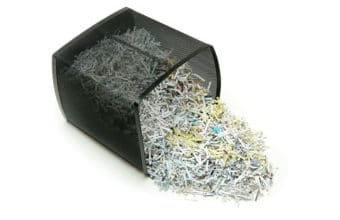Document Shredding
-
Shredding Tips and Tricks for Important HR Documents
Companies store valuable information about their employees for various reasons. For instance, they may retain a worker’s address and Social Security Number for tax and identification purposes, and they typically store bank account details for direct deposit of salaries. The HR department usually retains most documentation containing sensitive employee data. They’ll also have personal information […]
read more -
Shredder Security Levels: What Your Business Needs to Know
Did you know that not all document shredding methods are the same? There are a variety of different shredder security levels suited for different applications. The level you need will vary depending on the nature of your business and the specific documents you’re looking to destroy. Level P-1 Paper Shredding Level P-1 shredding is a […]
read more -
Why Consistent Shredding Practices Are So Important?
Document shredding is a standard security and privacy practice for just about every type of business. From employee information to trade secrets and financial accounts, you don’t want documents you handle during day-to-day operations falling into the wrong hands. Maintaining consistent shredding practices makes doing that easy. Keeping Your Business Organized One of the primary […]
read more -
4 Documents You Should Never Shred
Shredding papers that are no longer needed is a safe and reliable means of maintaining the confidentiality of your business records. Even everyday paperwork can contain information that is better kept private, and shredding prevents those details from being compromised. With that being said, however, you shouldn’t be so quick to shred some documents, as […]
read more -
Why Data Management and Document Destruction Go Hand-in-Hand
Businesses today are handling more data than ever before. Even businesses outside of the finance or healthcare industries still regularly handle documents with sensitive information. Data management can be a challenge, but it does need to be taken very seriously. Document destruction should be a part of every business’s data management process. There are several […]
read more -
4 Things to Include in Your Data Security Training on Document Shredding
One of the biggest problems businesses face when it comes to data security is human error. That’s because humans are still the number one weak point in data security We all make mistakes, of course, but businesses must do everything possible to eliminate the kind of mistakes that can lead to a data breach. The […]
read more -
4 Reasons to Re-Evaluate Your Shredding Needs in 2023
Most businesses have some form of document organization and destruction processes, but few have optimal shredding practices. Document shredding is key to any business — especially businesses that process sensitive documents. There are four reasons to re-evaluate your shredding needs in 2023. 1. Organization One of the primary reasons to invest in shredding in 2023 […]
read more -
Document Destruction Policy Refresh: What Needs Updating and How Often?
If there’s one thing you want to make sure your business has nailed down, it’s your document destruction policy. A data breach can not only come with serious monetary consequences but also do irreparable harm to your organization’s reputation. With that being said, you don’t just want a strong, clear document destruction policy — you […]
read more -
Employment Record Retention Guidelines: How Should Terminated Employee Files Be Purged?
There is no one-size-fits-all answer as to when you should purge a former employee’s files and documentation since the laws and regulations governing the retention of employee records vary by jurisdiction. However, as a general rule, it is best to purge terminated employee files after a reasonable time has passed, and there is no longer […]
read more














